- Home
- Robert Graves
Wife to Mr. Milton Page 8
Wife to Mr. Milton Read online
Page 8
My father would often take me with him to watch these operations, for he said that if I married a country gentleman (as he hoped I would) and if he died or fell sick, I must learn to oversee the labourers, to prevent them from spoiling the estate. He also showed me the different soils in the countryside about, and told me how each was best dressed and planted, and how to keep the fields clean of weed, and how to scare off the crows, and how to prevent stacks from burning by their own heat when the crops were harvested too moist or too green. He taught me also the proper care of cattle, of which we had always a herd of twenty cows, with a bull, which yielded abundance of milk.
Our most leisurely times were in the month of May, when all our seed was in the ground and no hay or corn ready to cut, and the latter end of September, when the harvest was for the most part over, and the wheat seed not fully come.
With the needle I had skill enough: I could sew an even seam and stitch a neat button-hole. But lace-making and fine embroidery were beyond my scope. I loved to spend the whole morning between the kitchen and the pantry-closet, preparing some new dish. I would undertake faithfully to keep to the recipe given me, but always the Devil overcame me and I would add something new, hoping to better it; which was a great risk, for if the dish turned out well, I was excused with grudging praise, but if I spoilt it my mother would take me up to my chamber and whip me well for my presumption. I remember her crying at me: “Too much nutmeg; unnecessary cinnamon; a want of salt; too long in the baking; and again, a plentiful want of salt. O, will you never learn obedience?” At each accusation there came a blow of the whip about my shoulders, which made me wince; but I did not weep or cry out.
When she had done I said faintly: “Madam, I thank you at least for excusing me the sweet-marjoram.”
She raised her whip at that but then laid it down again and said smiling: “Nay, my dear, the marjoram would have been a wise addition, but for your other errors.”
The work in the coppices of Shotover occupied a great part of my father’s time. These coppices, as I have already written, had been much spoiled and decayed, with fallen trees rotting on the ground, and many of the stems and stocks dead and worn out: so that in truth they were, for the most part, undeserving of the name of coppices. Rather, they were thin sherwood, or underwood, overspread with thorns and brambles; and in the summer great bowers of the purple loosestrife grew there. However, my father owed the Bishop no rent for the first ten years. He put the coppices to rights piece by piece, and had sufficient gain for his labour in firewood and the wood that served for his hurdle-making and in such fallen timber as was yet sound. After ten years he would owe the chief-rent of £100 annually to the King and a further £100 to the Bishop; but by that time the coppice would be worth this rent and more, for Oxford City can never be satisfied with firewood. My father did not fell the coppices a whole stretch together, but “drew them out,” as he called it: every year felling some, as the wood came to be of a sufficient height and bigness for cutting. According to the Statutes, each billet ought to be three foot four inches long, but the number of inches about it varied as it was named and marked.
My brothers were taught Latin by the curate, and the bailiff taught them to reckon and cast accounts. I learned a little Latin with my brothers, enough to read Cæsar’s Commentaries; and my mother taught me French; and from my father I learned to sing and play upon a little guitar which he gave me, wrought with ivory and ebony on the back. The guitar is the most cheerful instrument of the lute kind, and I would brush the strings carelessly with my fingers or drum upon the sound-board; but trusted more to my voice, which is true enough in pitch, than to the instrument. From Trunco I had the arts of the stilling-room, and of simple physic. In short, I knew a little of most things useful for a woman of quality; and my mother, who was severe in her judgments, agreed that I was marriageable and might soon make a good match, even without a large dowry; but would rather have me wait two or three years.
As a Justice of the Peace, my father knew more of the Law, I believe, than many of the learned gentlemen who sat with him at the Quarter Sessions; but at Forest Hill, in those days before the war, offences were few, and seldom were fastened upon any of our own people, except for such small matters as broken fences or dogs that preyed upon sheep. However, the Worcester road, in the summer especially, was travelled by numbers of sturdy rogues and vagabonds, who stole sheets and handkerchiefs from the hedge, robbed henroots and orchards and committed numerous other felonies. My father was stern with these wretches, many of whom were old soldiers who had served in the Dutch armies or under the Swedish King and cared little for the blows that they received at our whipping-post, being accustomed to far more severe beatings from their serjeants; but knowing that they hated cold water, he would have them soused in the stinking water of the yard, and thus give them a lesson to avoid Forest Hill.
There were often charges made against poor old women who were accused of blasting pastures, of overlooking cattle to make them miscarry, of turning milk sour, and of afflicting little children with spots and rashes; but these charges, when he closely examined them, were always groundless and the aged trots guilty only of a miserable poverty. Old Mother Catcher, who lived in a wretched cottage of sticks and turves down by Bayardswater Mill, was one day found with frogs and snails and other small hopping or creeping things in a bag, and also with some roots of curious shape. It was deposed by the wife of Tomlins the Miller that she evidently intended some mischief against the mill, for being suddenly surprised she let fall the bag and ran off, and out hopped the frogs. Yet my father would not believe any malice against the old woman and, by his kind demeanour, drew the true story from her. She had a son, a labouring man, who would not cheerfully support her; and not wishing to suffer the disgrace of making application for relief to the parish officers, or perhaps fearing to lose her liberty, she sustained herself for awhile with roasted acorns and cresses. Then finding this diet mean and tedious, and longing for some flesh food, she had bethought herself that Frenchmen eat frogs’ legs and make a thin broth of snails, and why should not she? But she had been ashamed when Tomlins’ wife surprised her at her hunting, and so ran off. The roots were orris, for drying and powdering, which had been commanded by the curate’s wife for the perfuming of the Church linen.
So my father gave old Mother Catcher a few shillings, and a loaf or two of bread, and a lump of brawn, and recommended the miller’s wife, if she hoped for reward in Heaven, to spare the old woman sometimes a parcel of spoiled flour to make griddle-cakes; which she undertook to do.
Afterwards, Mother Catcher showed her gratitude to my father by simpling for us; and one day she brought him a silver-gilt button, of a set that he prized, which he had lost from his coat when he went hunting.
CHAPTER FIVE
Mun Becomes a Soldier
Now to Mun again. Generally, all that happened to Mun that was of consequence to me grew out of the great events of these times; of which I must keep a running account if I would have my tale understandable. For so much water has now flowed under the bridges of Severn, Thames and Tweed, mingled with blood, and so many allies have turned enemies, and enemies allies, that most men have clean forgotten how affairs stood at the beginning of our troubles.
I had first become acquainted with Mun in the March of 1637. He rode out again from Oxford twice in that same month, and once in April; but was ashamed that any should know that his principal object in coming was to see a little girl, such as I was, and therefore behaved himself circumspectly. The first time, by good fortune, I had the happiness of sitting alone with him for a few minutes in the arbour by the bowling-green, while my father and my brothers finished their rubber. We said little to each other but I basked in his company, and he seemed cheered by mine. The second time, though, all went amiss: for I was kept working in the upper dairy-house all afternoon, and saw no more of him than his plume bobbing along the road as he rode away. The third time, when he came to take his leave of the household, b
ecause his angry father was come to remove him from the University, I contrived that he should see me go into the primrose coppice, where I waited for him half an hour or longer; and at last he came and lifted me up in his arms and kissed me, calling me his pretty fairy, and confessed himself utterly ruined by his follies. He assured me that of all the faces that he had seen throughout the time he had been at Oxford, mine was almost the only one he would miss when he was gone. Mun asked leave to write letters to me; but I denied him that, for my mother would never let me hear the last of it, if he did. Then he proposed to write often to my brother Richard, instead, with a loving message to me each time.
“O, no, Mun,” said I, “that will be no better, not the least thing, for Dick will make sport of me and call you my Conquest. Dick is not to be trusted with any such message. Write to Dick, by all means, and tell him how you do, but append no particular message for me.”
“You desire no message from me?” he asked. “You despise me for the manner in which I have wasted my terms at Oxford, and hoodwinked my father?”
“No, sweet Mun,” I replied, “for I believe that there is no malice in you, only a love of great company (which I confess I share) and not sufficient fortune to bear it up. I have no doubt but that you will make amends.”
“It would be easy to avoid falling into despair,” he began in a very urgent, sad voice, “if only I could think—” but there he left the sentence hanging. After a while he continued: “None of my friends or kindred have any good opinion left of me, and if I could think that one person at least in this whole land—” Here he could say no more.
“Oh, poor soul,” said I, weeping. I stroked his face and told him that he was dearer to me than any of my brothers, or my parents even, and that there was nothing in the whole world that I would love better than a letter from him, if it could be contrived without vexing my parents, but so it could not; and that I knew well that he would never fall into the same course of folly again; and that I wished him heartily well, and thought of him fifty times a day, and would so continue, I hoped, to the end of my life.
These childish words of mine put him into a better conceit with himself, and he told me that he was commanded to go to a Mr. Crowther, late of Hart Hall, for whom his father had procured a country living in Buckinghamshire, and repair his wasted learning under his guidance. However, I guessed that Mun had already outgrown his pupillage, and that it would be hard indeed for him at present to return to the rudiments of school-learning, even when roughly drawn away from his fine new friends. Then he declared solemnly that he hoped to be worthy of my esteem, but that he was cursed by a very facile nature: being easily drawn into mischief, unless there was a nail driven through the skirt of his coat to hold him back to his bench.
I was too young to speak rationally to him, but I looked affection and confidence at him, which gave him satisfaction; and he told me, half in earnest, half in jest, that as yet he loved no woman, but that one day, if I made haste to grow, he would ask my father leave to many me. Meanwhile, I would be his little she-friend, and he my devoted servant.
At this I heard Trunco calling me from the yard, and I grasped his hand hastily and cried, “Farewell, Servant!” and ran towards the kitchen, while he went slowly off towards the stables to his nag; and that was all our good-bye for nearly half a year.
Within a month, Mun’s tutor was taken ill and died, and he went to live with his uncle, Sir Alexander Denton, at a place called Hillesden in Buckinghamshire, and continued there for some time, helping his uncle with the management of his estate. Then, at the end of the summer, he rode over to see us, making it his excuse that he had a debt to pay at Oxford; and since he had meanwhile written three or four letters to my brother Richard, and always presented his dutiful respects to my parents, he was well received at our house. While he and I were together with the rest he teased me and talked big to me; but I took no offence, for as soon as we were alone his voice altered and grew tender. He was then in mind to go on a voyage to the Barbadoes with the Earl of Warwick, who had bought a plantation situate in the best and healthfullest of all those western islands. Many fine fruits were plentiful there, such as oranges, lemons, limes, plantains, pine-apples and guavas, with pepper, cinnamon and ginger, and cabbages that grew upon trees. The chief bread was potatoes, boiled and pressed, which were very nourishing and pleasant and did not weary the palate—not though one ate them at every meal. The greatest inconvenience of which Mun had heard was the land-crabs, which were thick upon the ground and would bite through a man’s boot or nip off his thumb if he lay sleeping upon the ground; but there was also a great want of skilled labour, and of household stuff, both metal and linen, and the island lay at so great a distance from England that going there one might almost fancy oneself in the Moon.
In the end he did not sail, and for this reason only, I believe, that when he told me of it I wept and would not be easily comforted. I cried that I feared not on his account in the matter of the land-crabs, but that I hated the Ocean: he would surely be cast away and eaten by the sharks, either on his voyage there or as he returned. I do not know what excuses he made to his family, but he let them know that he had altered his mind. His elder brother Tom went in his place, but did not prosper and soon sailed home to England.
Meanwhile the Arminian clergy, led by Archbishop Laud (who had lately succeeded Archbishop Abbot, the unfortunate homicide) persuaded the King to lay such a uniformity of worship upon the Churches throughout his dominions as neither his father King James nor Queen Elizabeth had ventured upon. Ever since King Henry VIII quarrelled with the Pope of Rome, the Church had stood like a rickety table upon legs of uneven length, propped underneath with paper wads of tolerance and, whenever tolerance could not be granted to plain heresy, with wooden wedges of subterfuge; but now the Archbishop would saw the legs off even, and put the table level, and cast away the wads and wedges. Nevertheless, knowing the temper of the English people, he did not dare to foist his new Liturgy at once upon our nation, but thought it wiser “to try it upon the hound,” as the phrase is, by ad-ministering it to the Scots, who were but a poor, small nation.
This proved a grand error, for the Scots had queasy stomachs and vomited out the Liturgy and ran and swore a Covenant together and, though the King was of the Royal House that they had themselves given to England, and though he had been born at Dunfermline in Scotland, yet they defied him. They challenged him to use force against them and called up their levies, which they officered with men who had seen service in the Swedish wars; and declared that, so far from accepting the Liturgy, they would not even acknowledge the rule of their own bishops who had recommended it to them, but would set church elders, or presbyters, in their place and govern the Church by assemblies.
When the first news of the uproar in the North came to the Court in London, Archie Armstrong, the King’s Fool, meeting with Archbishop Laud on his way to the Council, forgot that the Bauble may not insult against the Mitre: he called him by a lewd name, and asked him, who was now the Fool? This jest was not taken kindly either by the Archbishop or by the King; and Archie, being hauled before the Council, was sentenced to have his Fool’s coat pulled over his ears, to be kicked out of doors and never show his face at Court again; which was done, and his office given to another Scottish fool named Muckle John, who was a dull slouch, with a heavy eye and a hanging lip. It was a bold man who durst speak or write against the Archbishop, as our friend the learned Mr. Lambert Osbaldiston found about this time; who, for styling him a “little vermin and hocus-pocus” in a private letter written to the Bishop of Lincoln, was fined £5,000, deprived of his Mastership of Westminster School and sentenced to be tacked to the pillory by his ears in the presence of all his scholars. Yet Archie the Fool had the last laugh, for the Council that sentenced him is now abolished; and he has kept his head upon his shoulders longer than either the Archbishop or the King.
There was no remedy but that the King must take up arms against the Scots; and Mun was cau
ght up into this war, such as it was. He was fitted out as a volunteer by Sir Edmund Verney, his father, who, being Knight-Marshal and Standard-Bearer to the King, marched to Scotland with the army that had been collected. The King had not summoned a Parliament, to ask money of them for the payment of his troops: for he knew that before they voted him any sufficient subsidy they would call upon him to redress the country’s grievances, which had mounted pretty high in these many years of his governing without a Parliament. Besides, there was little love for our own bishops in many parts of England. Among the tradesmen and mechanics of London, and in the Eastern counties generally, it was openly said that the Scots were brave boys and did well to vindicate their rights. The King had written a letter to all the nobility, in January of the year 1639, calling upon them to bring their armed retainers to a rendezvous in Yorkshire. In answer, some nobles promised twenty horsemen and £1,000 of money; some £500 and five horsemen; some were wary and undertook to attend with as good an equipage as their fortune and the shortness of the time would permit; some pleaded poverty, reminding His Majesty of great debts owing them from his Treasury, and feared that they could send but little. In all, they did not offer much, and two noblemen, the Lord Brooke and the Lord Saye and Sele, refused together, unless Parliament should first give them the order—for which disobedience they were committed to custody. The Commons of every county and city were also called upon for free contributions; but the King’s expectations were disappointed in the amount, the whole City of London offering no more than £5,200, about sixpence a head, which His Majesty considered paltry and refused with scorn. However, the clergy gave generously; for Archbishop Laud could draw money out of them by the screw of discipline, and told them plainly that His Majesty looked for a greater sum than in the ordinary way. Even our curate was expected to contribute £5, which was one-quarter of his annual stipend.

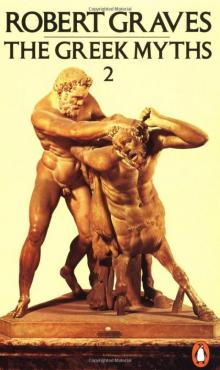 The Greek Myths, Volume2
The Greek Myths, Volume2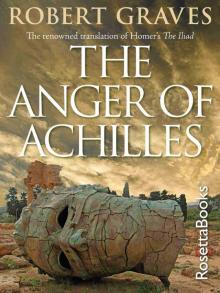 The Anger of Achilles: Homer's Iliad
The Anger of Achilles: Homer's Iliad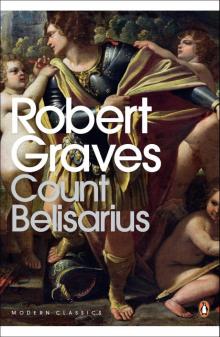 Count Belisarius
Count Belisarius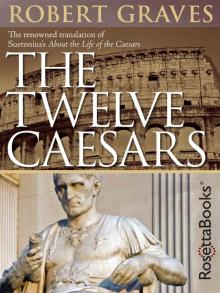 The Twelve Caesars
The Twelve Caesars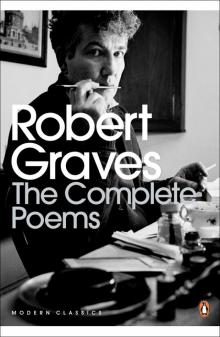 Complete Poems 3 (Robert Graves Programme)
Complete Poems 3 (Robert Graves Programme) Homer's Daughter
Homer's Daughter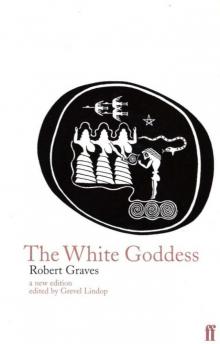 The White Goddess
The White Goddess Goodbye to All That
Goodbye to All That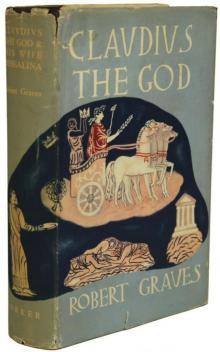 Claudius the God and His Wife Messalina
Claudius the God and His Wife Messalina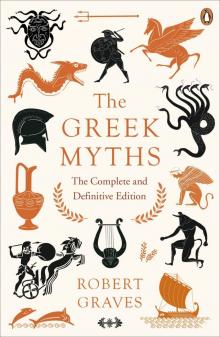 The Greek Myths
The Greek Myths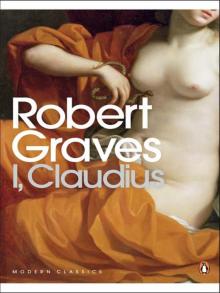 I, Claudius
I, Claudius The Islands of Unwisdom
The Islands of Unwisdom Complete Short Stories
Complete Short Stories The Golden Fleece
The Golden Fleece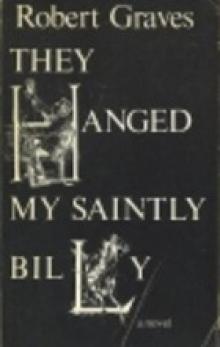 They Hanged My Saintly Billy
They Hanged My Saintly Billy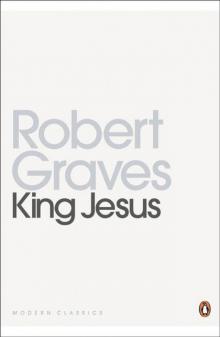 King Jesus
King Jesus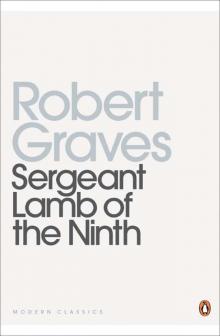 Sergeant Lamb's America
Sergeant Lamb's America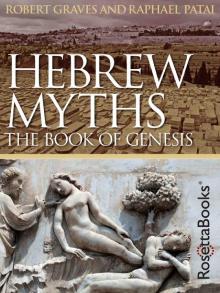 Hebrew Myths: The Book of Genesis
Hebrew Myths: The Book of Genesis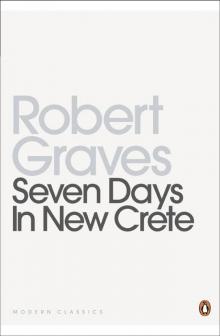 Seven Days in New Crete
Seven Days in New Crete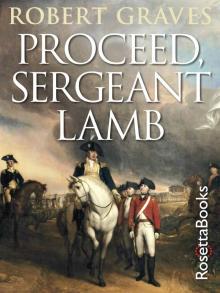 Proceed, Sergeant Lamb
Proceed, Sergeant Lamb Claudius the God
Claudius the God Wife to Mr. Milton
Wife to Mr. Milton The Complete Poems
The Complete Poems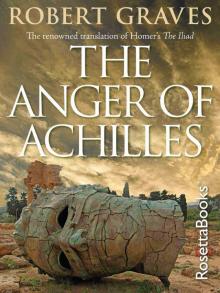 The Anger of Achilles
The Anger of Achilles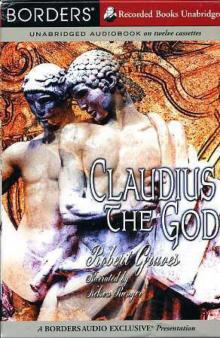 Claudius the God c-2
Claudius the God c-2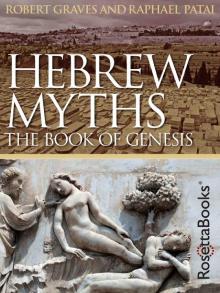 Hebrew Myths
Hebrew Myths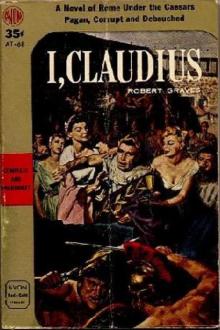 I, Claudius c-1
I, Claudius c-1 The Greek Myths, Volume 1
The Greek Myths, Volume 1